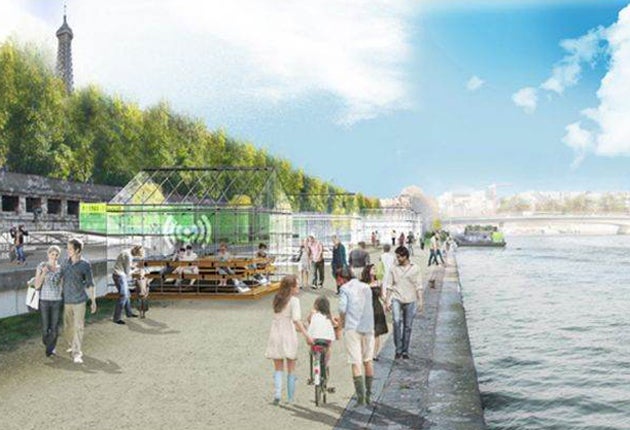Paris plans new beach on riverbank
Seine to be transformed if Mayor succeeds in shutting urban expressways

Your support helps us to tell the story
From reproductive rights to climate change to Big Tech, The Independent is on the ground when the story is developing. Whether it's investigating the financials of Elon Musk's pro-Trump PAC or producing our latest documentary, 'The A Word', which shines a light on the American women fighting for reproductive rights, we know how important it is to parse out the facts from the messaging.
At such a critical moment in US history, we need reporters on the ground. Your donation allows us to keep sending journalists to speak to both sides of the story.
The Independent is trusted by Americans across the entire political spectrum. And unlike many other quality news outlets, we choose not to lock Americans out of our reporting and analysis with paywalls. We believe quality journalism should be available to everyone, paid for by those who can afford it.
Your support makes all the difference.Paris is to be given a permanent "beach", or car-free zone on the lower quays of the Seine, under controversial plans unveiled yesterday by the city's Mayor, Bertrand Delanoe.
Two-lane urban motorways, which have disfigured one of the world's most beautiful riverscapes for four decades, would be partially abandoned and replaced by parks, foot and cycle paths by 2012.
The proposals are a permanent extension of the "Paris Plage", or beach, which has replaced a section of the urban expressway on the Right Bank of the Seine each summer since 2002.
Under the plan, a kilometre-long stretch of the Left Bank from the Musée d'Orsay to just before the Eiffel Tower, would become a permanent park, footpath and cycle track. According to the town hall's preliminary plans, there might even be small off-shore islands, complete with palm trees.
To the disappointment of Green politicians and anti-car campaigners, the eastbound two-lane highway on the right, or north, bank of the river would not disappear completely.
Cars would still be allowed to drive along the lower quays but a 3km section through the historic heart of the city would be reduced to a "riverside boulevard".
Motorists, who can now drive at up to 90kph, would be slowed down by traffic lights. They would have to share the space with pedestrians and cyclists. Part of the existing road would be given over to new leisure areas.
The proposals, which will go out for public consultation, will infuriate the Parisian car and taxi drivers' lobbies who already complain about traffic jams in the city. They will also anger green lobbyists, who had been pestering Mr Delanoe to close the riverside expressways completely.
The Socialist Mayor said yesterday that his plan would "truly change Paris" and allow the French capital to "rediscover its relationship with the river".
To have completely closed the Voie Georges Pompidou on the right bank of the river, would have caused terrible traffic congestion and "discredited the project", Mr Delanoe said. By introducing traffic lights and reducing the space for cars the lower quays would be transformed from a "motorway" to a "human, lived-in boulevard". The Mayor estimated that one in four cars would be discouraged from using the lower quay on the right bank. Journey times would be increased by only five minutes.
It was the former Prime Minister and President Georges Pompidou who infuriated Parisian traditionalists by turning the lower river quays into separate east and westbound fast roads from 1967. Mr Pompidou, a great modernist, insisted on going ahead with the plan despite strident opposition – and despite the fact that he lived on the Ile Saint Louis overlooking one of the new stretches of urban autoroute.
The eastbound Voie Georges Pompidou, on the Right Bank, much busier than the westbound road on the Left Bank, now takes more than 40,000 cars each weekday. From 2002, Mr Delanoe has ordered a section of the road opposite the Ile de la Cité and the Ile Saint Louis to be closed for part of each July and August.
For five weeks, the asphalt is covered with bars, sand-pits, deckchairs and palm trees in large pots. The "Paris Plage" idea has been hugely popular and has been copied by cities all over the world.
Mr Delanoe's plan for a permanent extension of the idea has to go not only to public consultation but for approval by the national government, which has the final say on all roads of more than local importance.
Join our commenting forum
Join thought-provoking conversations, follow other Independent readers and see their replies
Comments